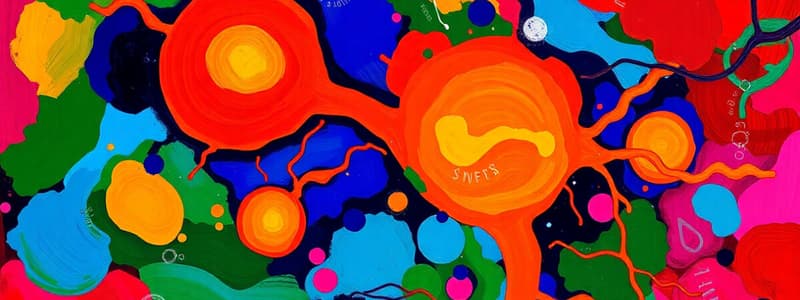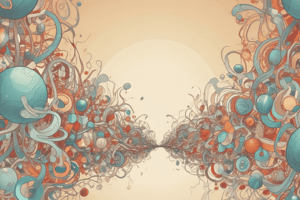Podcast
Questions and Answers
What effect does prolonged exposure to low hormone concentrations have on receptors?
What effect does prolonged exposure to low hormone concentrations have on receptors?
- Upregulation of corresponding receptors (correct)
- Downregulation of receptors
- Total receptor inactivity
- No effect on receptors
Downregulation of hormone receptors can increase the effectiveness of a second hormone.
Downregulation of hormone receptors can increase the effectiveness of a second hormone.
False (B)
What is the primary outcome of high concentrations of a hormone concerning receptor regulation?
What is the primary outcome of high concentrations of a hormone concerning receptor regulation?
Downregulation of receptors
Hormones can be transported in blood and reach all body tissues, but the response to a hormone is highly _____ specific.
Hormones can be transported in blood and reach all body tissues, but the response to a hormone is highly _____ specific.
Match the types of control factors for hormone secretion with their descriptions:
Match the types of control factors for hormone secretion with their descriptions:
What stimulates the synthesis of steroids?
What stimulates the synthesis of steroids?
Proinsulin is secreted by the adrenal cortex.
Proinsulin is secreted by the adrenal cortex.
What is the primary site of steroid production in the body?
What is the primary site of steroid production in the body?
Steroids in plasma bind reversibly to __________ for circulation.
Steroids in plasma bind reversibly to __________ for circulation.
Which of the following substances are inhibitors of Protein Kinase A?
Which of the following substances are inhibitors of Protein Kinase A?
Steroids directly affect microvascular blood flow.
Steroids directly affect microvascular blood flow.
What important role does proinsulin play in the body?
What important role does proinsulin play in the body?
Match the following elements with their descriptions:
Match the following elements with their descriptions:
Which of the following hormones is mainly produced by the gonads?
Which of the following hormones is mainly produced by the gonads?
Water-soluble hormones are poorly soluble in plasma.
Water-soluble hormones are poorly soluble in plasma.
What are the major mechanisms of action for water-soluble hormones?
What are the major mechanisms of action for water-soluble hormones?
The adrenal cortex produces five major hormones, including __________ and androgens.
The adrenal cortex produces five major hormones, including __________ and androgens.
Match the following hormones with their respective categories:
Match the following hormones with their respective categories:
Which mechanism is responsible for the activation of genes by lipid-soluble hormones?
Which mechanism is responsible for the activation of genes by lipid-soluble hormones?
Ca2+ can serve as a second messenger in water-soluble hormone signaling.
Ca2+ can serve as a second messenger in water-soluble hormone signaling.
What is the function of Janus kinase (JAK) in hormone signaling?
What is the function of Janus kinase (JAK) in hormone signaling?
What stimulates differentiating chondrocytes to undergo cell division?
What stimulates differentiating chondrocytes to undergo cell division?
Growth hormone is secreted at a constant rate throughout the day.
Growth hormone is secreted at a constant rate throughout the day.
What is the primary effect of growth hormone on tissues?
What is the primary effect of growth hormone on tissues?
Differentiating chondrocytes begin to secrete _____ and become responsive to it.
Differentiating chondrocytes begin to secrete _____ and become responsive to it.
Match the following effects with their corresponding substances:
Match the following effects with their corresponding substances:
What hormone can enhance prolactin secretion from the anterior pituitary?
What hormone can enhance prolactin secretion from the anterior pituitary?
Oestradiol secretion is controlled by prolactin.
Oestradiol secretion is controlled by prolactin.
What are the primary hormones secreted by the thyroid gland?
What are the primary hormones secreted by the thyroid gland?
Low blood levels of T3 and T4 or a low metabolic rate are stimuli for the regulation of ______ function.
Low blood levels of T3 and T4 or a low metabolic rate are stimuli for the regulation of ______ function.
Match the following hormones with their respective actions:
Match the following hormones with their respective actions:
Which of the following is a non-sequence hormone that can influence hypophysiotropic hormone secretion?
Which of the following is a non-sequence hormone that can influence hypophysiotropic hormone secretion?
The control of thyroid hormones is solely dependent on their own levels in circulation.
The control of thyroid hormones is solely dependent on their own levels in circulation.
What type of transporter is responsible for iodide trapping in the thyroid?
What type of transporter is responsible for iodide trapping in the thyroid?
Flashcards are hidden until you start studying
Study Notes
Proinsulin
- Proinsulin is secreted by the pancreas into the blood.
- It is a key regulator of metabolism and is present in roughly equimolar amounts with insulin in the blood
- Proinsulin has a bioactive effect on microvascular blood flow and tissue health
- Proinsulin has 4 amino acid residues that are removed to form mature insulin.
Steroid Hormone Synthesis
- Steroid hormones are primarily produced in the adrenal cortex, the gonads (testes and ovaries), and the placenta during pregnancy.
- Synthesis of steroid hormones is initiated by G protein-coupled receptor signaling.
- The signal is then transduced through cyclic AMP (cAMP) and protein kinase A (PKA).
- Caffeine and theophylline act as inhibitors of PKA, which is the enzyme involved in signaling and the synthesis of steroid hormones.
Steroid Hormone Circulation
- Steroid hormones circulate in the plasma and reversibly bind to carrier proteins such as albumin.
- Steroid hormones are taken up from the extracellular fluid.
- Also, it is possible that steroid hormones can be synthesized intracellularly.
Steroid Hormones - Adrenal Cortex
- The major hormones produced in the adrenal cortex include:
- Glucocorticoids, which also have weak mineralocorticoid activity
- Mineralocorticoids
- Androgens
Steroid Hormones - Gonads
- Gonads use the same androgen pathway used in the adrenal cortex.
- The gonads produce the following hormones:
- Estrogens
- Progestins
Water-Soluble Hormone Signaling
- Water-soluble hormones use second messengers, such as cAMP and calcium ions (Ca2+), to signal in the cells.
- Water-soluble hormones can activate enzymes through receptors such as Janus kinase (JAK)
- Some water-soluble hormone receptors have intrinsic enzymatic activity, such as tyrosine kinase.
Lipid-Soluble Hormone Signaling
- Lipid-soluble hormones are poorly soluble and need carrier proteins in order to move through the plasma.
- These hormones can diffuse through cell membranes.
- They bind to intracellular receptors that act as transcription factors, controlling gene expression.
Hormone Action
- Hormones are transported throughout the body in the blood.
- They can reach all tissues, BUT the response to the hormone is cell-type specific.
- Continuous exposure to low concentrations of a hormone can cause upregulation of cell receptors, making the cells more sensitive to the hormone.
- Exposure to high hormone concentrations can cause downregulation of cell receptors, making cells less sensitive to the hormone.
Hormone Regulation
- Hormones can downregulate or upregulate receptors for other hormones
- Downregulation reduces the effectiveness of the second hormone.
- Upregulation increases the effectiveness of the second hormone.
- Permissiveness is the phenomenon where one hormone is required for another hormone to exert its full effect.
Control of Hormone Secretion
- Hormone secretion is controlled by three main factors:
- Hormonal signals: hormones can stimulate or inhibit the release of other hormones.
- Neuronal signals: the nervous system can directly regulate hormone secretion.
- Plasma composition: alterations in the concentrations of ions or organic molecules can influence the secretion of certain hormones.
- It is possible for multiple regulatory systems to control the secretion of a single hormone.
### Thyroid Hormones
- The thyroid gland synthesizes and secretes thyroid hormones (T3 and T4).
- Synthesis requires the uptake of iodide from the plasma.
- Iodide is coupled with the amino acid tyrosine to form thyroid hormones.
### Control of Thyroid Hormone Secretion
- Thyroid hormone secretion is regulated by a negative feedback mechanism.
- This feedback loop is activated by low levels of T3 and T4 and low metabolic rate.
Actions of Thyroid Hormones
- Thyroid hormones significantly contribute to the regulation of:
- Basal Metabolic Rate
- Cardiovascular function
- Growth and development
- Nervous System function
Growth Hormone
- Growth hormone is a hormone that stimulates protein synthesis.
- It is produced and secreted by the pituitary gland.
- Growth hormone stimulates protein synthesis in many tissues, especially muscles.
- It increases the uptake of amino acids and the synthesis and activity of ribosomes.
Growth Hormone Secretion
- Growth hormone secretion is regulated by numerous factors.
- Secretion occurs in episodic bursts throughout the day.
- Secretion is low during the day, but bursts can be triggered by specific stimuli, such as exercise and sleep.
- The frequency of bursts can be affected by age, stress, and nutritional status.
Studying That Suits You
Use AI to generate personalized quizzes and flashcards to suit your learning preferences.

